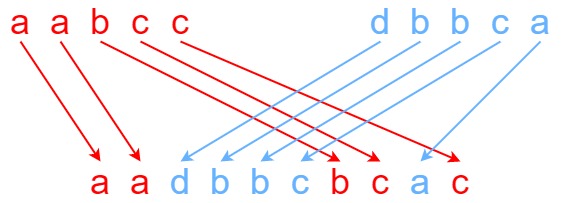Description
Given strings s1, s2, and s3, find whether s3 is formed by an interleaving of s1 and s2.
An interleaving of two strings s and t is a configuration where s and t are divided into n and m
substrings
respectively, such that:
s = s1 + s2 + ... + snt = t1 + t2 + ... + tm|n - m| <= 1- The interleaving is
s1 + t1 + s2 + t2 + s3 + t3 + ...ort1 + s1 + t2 + s2 + t3 + s3 + ...
Note: a + b is the concatenation of strings a and b.
Example 1:

Input: s1 = “aabcc”, s2 = “dbbca”, s3 = “aadbbcbcac” Output: true Explanation: One way to obtain s3 is: Split s1 into s1 = “aa” + “bc” + “c”, and s2 into s2 = “dbbc” + “a”. Interleaving the two splits, we get “aa” + “dbbc” + “bc” + “a” + “c” = “aadbbcbcac”. Since s3 can be obtained by interleaving s1 and s2, we return true.
Example 2:
Input: s1 = “aabcc”, s2 = “dbbca”, s3 = “aadbbbaccc” Output: false Explanation: Notice how it is impossible to interleave s2 with any other string to obtain s3.
Example 3:
Input: s1 = "", s2 = "", s3 = "" Output: true
Constraints:
0 <= s1.length, s2.length <= 1000 <= s3.length <= 200s1,s2, ands3consist of lowercase English letters.
Follow up: Could you solve it using only O(s2.length) additional memory space?
Code
DFS with memo
Time Complexity: , Space Complexity:
注意 memo 的大小是 (m + 1) * (n + 1),因為遞迴可能會有 i == m 或是 j == n 的 case。
class Solution {
public:
bool isInterleave(string s1, string s2, string s3) {
if(s1.length() + s2.length() != s3.length()) return false;
int m = s1.length(), n = s2.length();
vector<vector<int>> memo(m + 1, vector<int>(n + 1, -1));
return dfs(0, 0, s1, s2, s3, memo);
}
bool dfs(int i, int j, string& s1, string& s2, string& s3, vector<vector<int>>& memo) {
if(i >= s1.length() && j >= s2.length() && (i + j) == s3.length()) return true;
if(memo[i][j] != -1) return memo[i][j];
bool a = (i < s1.length() && s1[i] == s3[i + j]) ? dfs(i + 1, j, s1, s2, s3, memo) : false;
bool b = (j < s2.length() && s2[j] == s3[i + j]) ? dfs(i, j + 1, s1, s2, s3, memo) : false;
memo[i][j] = a || b;
return memo[i][j];
}
};